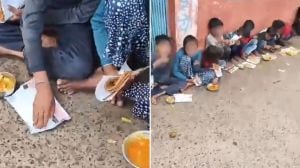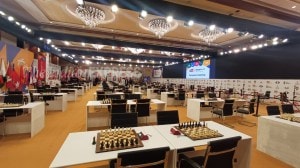BARELY 24 hours after the 11-hour siege in a Dhaka restaurant ended with the deaths of at least 22 hostages and policemen, Bangladesh Sunday blamed “homegrown Islamist terrorists” and Pakistan’s ISI for the attack, and ruled out the role of Islamic State, which had claimed responsibility.
Police also released the names and photos of six of the attackers who were shot at the end of the siege. A seventh was arrested and is being interrogated by intelligence officers.

“Let me clear it again, there is no IS or al-Qaeda presence in Bangladesh… the hostage-takers were all home-grown terrorists and not members of IS or any other international Islamist outfits,” said Home Minister Asaduzzaman Khan.
Story continues below this ad
Hours earlier, IS’s media arm, Amaq, had released photos purportedly of five of the attackers, all wearing keffiyehs and posing with guns in front of the outfit’s flag.
Beyond the claims and counters, however, The Indian Express was able to piece together the profiles of at least three of the gunmen. They were from rich families, studied in an elite school in the capital and had been reported missing by their families four-five months ago.
[related-post]
Watch Video: What’s making news
Nibras Islam, Rohan Imtiaz and Meer Shameeh Mubasher were first identified by their friends and aquaintances on Facebook, within hours of their pictures being splashed across social media. Police said Imtiaz was the son of an Awami League leader, Imitiaz Khan Babul.
An official at a private school, Scholastica, confirmed that the three had studied there. “They studied in Scholastica school but we did not see any such behaviour at the time. We cannot comment on what they did after leaving school. We are shocked and condemn such activities,” said Zia Hassan, who handles corporate communications at the school.
Story continues below this ad
Another senior school official told The Indian Express, on condition of anonymity, that the three had completed their O-level courses. “They were normal students, and were part of school clubs and other activities,” said the official.
 Three of the gunmen had studied in Scholastic school, which charges about 15,000 Bangladesh Taka (about 1) as monthly fees. (Express Photo: Shubhajit Roy)
Three of the gunmen had studied in Scholastic school, which charges about 15,000 Bangladesh Taka (about 1) as monthly fees. (Express Photo: Shubhajit Roy)
Nibras completed school in 2013, Rohan in 2014 and Mubasher in 2015.
The main campus of the Scholastica school, a white building with imposing architecture and tall gates in Dhaka’s Uttara area, is a few kilometres away from the airport — Rohan Imtiaz studied at the school’s Mirpur campus. The school was closed for Eid holidays on Sunday, even as security officials guarded the campus.
An official described Scholastic, which has five campuses in Dhaka with about 6,000 students, as an “expensive school” charging about 15,000 Bangladesh Taka (about $191) as monthly fees.
Story continues below this ad
“They are all highly educated young men and went to university. No one is from a madarsa,” said Home Minister Khan, adding, “We know them (hostage-takers) along with their ancestors, they all grew here in Bangladesh…they belong to homegrown outfits like Jamaat-ul-Mujahideen Bangladesh (JMB).”
“This is in sharp contrast to the stereotype of madarsa-educated students turning to terrorism, at least three Bangladesh attackers were alumni of elite schools. This the new trend in Bangladesh-born terrorists…it is a very dangerous trend,” Arif Jebtik, a secular blogger and activist who has been on the hitlist of terror outfits, told The Indian Express.
An Indian diplomat said, “This is not like the Ajmal Kasab of 26/11, who is from an impoverished background…these are from educated and elite backgrounds”.
According to Bangladesh local media, Mubasher went missing on February 29 after leaving home to attend a coaching class. CCTV footage reportedly tracked him taking an autorickshaw in Dhaka.
Story continues below this ad
Nibras Islam was also reportedly a student of North South University in Basundhara. When The Indian Express visited the sprawling campus, it found the institution was shut for Eid holidays. Nibras reportedly liked playing football and was very popular among fellow students.
“Friends say he was quiet and not very religious. However, he broke off contact with friends in Bangladesh after moving to Malaysia to study at Monash University. He then turned religious. After coming back to the country sometime at the beginning of the year, he disappeared on February 3, and was last seen in a neighbourhood in Uttara. There were posts on his Facebook wall where friends asked him where he is,” a local news website reported.
Rohan Imtiaz, who also studied at Monash University in Malaysia, was the son of a teacher at Scholastic. “His Facebook profile was filled with status updates about malpractices by Muslims, his views on women donning the niqab… most of his Facebook commentary can be perceived to be radical in nature,” a news website reported.
The identities of the three appear to corroborate claims made by the Sheikh Hasina government about “homegrown Islamist terrorists”, mainly referring to JMB. Her party has always indicated that outfits like JMB and Ansarul Bangla derive their strength and philosophy from Jamaat-e-Islami, an extreme right-wing political outfit which has been banned by the Election Commission.
Story continues below this ad
Hasina’s Awami League had been in the Opposition, when Khaleda Zia’s BNP and Jamaat-e-Islami ruled the country between 2001 and 2006.
Hossain Toufique Imam, the political advisor to Prime Minister Sheikh Hasina, said the way in which the hostages were killed — with machetes — suggests the role of the banned JMB.
“Pakistan’s ISI and the Jamaat connection is well known. they want to derail the current government,” Imam told TV channels.

 Bangladeshis light candles as they pay tribute to those killed in the attack at the Holey Artisan Bakery in Dhaka, Bangladesh, Sunday, July 3, 2016. (AP Photo)
Bangladeshis light candles as they pay tribute to those killed in the attack at the Holey Artisan Bakery in Dhaka, Bangladesh, Sunday, July 3, 2016. (AP Photo)
 Three of the gunmen had studied in Scholastic school, which charges about 15,000 Bangladesh Taka (about 1) as monthly fees. (Express Photo: Shubhajit Roy)
Three of the gunmen had studied in Scholastic school, which charges about 15,000 Bangladesh Taka (about 1) as monthly fees. (Express Photo: Shubhajit Roy)





























